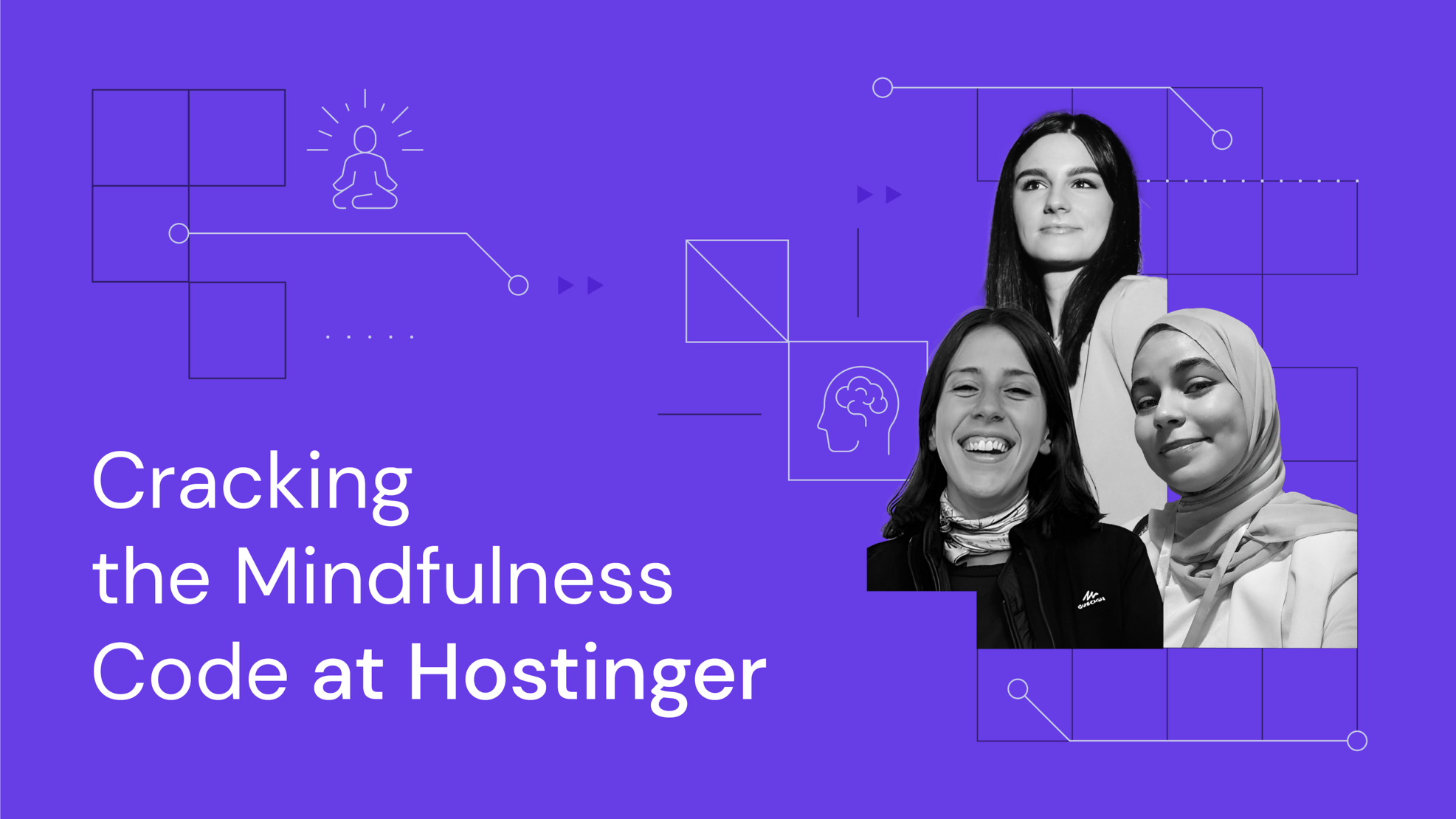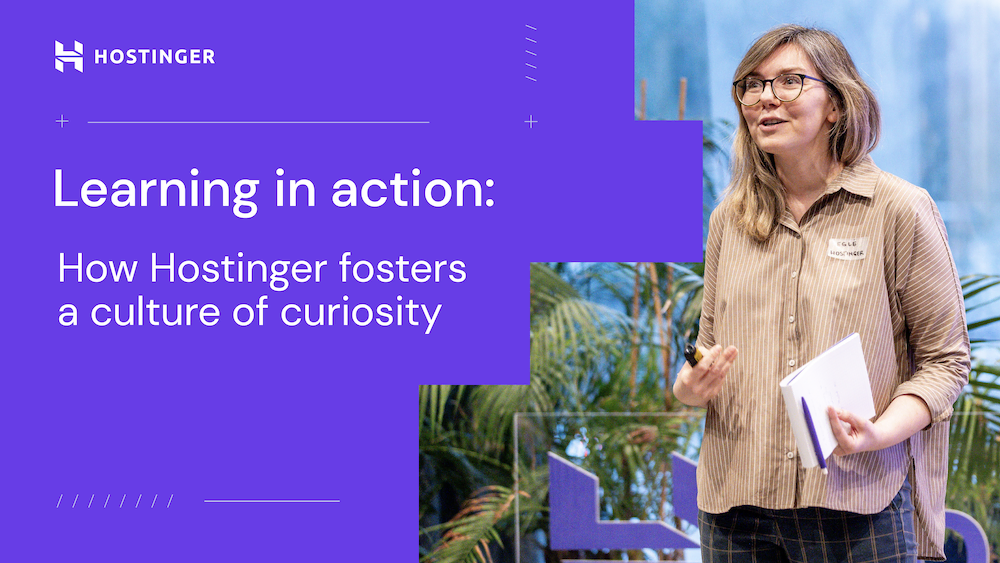Cracking the Mindfulness Code: Best Practices

Finding peaceful moments in the constant buzz of emails, notifications, meetings, and deadlines can be challenging. At Hostinger, we help our employees be more focused and innovative by integrating mindfulness into a daily work routine. Let’s breathe in and dive deep into our mindfulness practices and their benefits.
Mindfulness in the Tech Industry
Lauryna Vilutytė, Customer Success (CS) People Partner at Hostinger and an aspiring psychologist, shares that mindfulness is the art of being present in the current moment without any judgment or distractions. She highlights that mindfulness lets you peacefully accept and recognize your ideas, feelings, and physical sensations.
Let’s go over the mindfulness benefits in more detail:
- Stress management – employees who practice mindfulness are more likely to deal with stress better, think outside the box, and develop original solutions to challenges.
- Focus – it’s human nature to get distracted from what should be our main responsibility. Mindfulness helps us focus and embrace new experiences.
- Communication – awareness enables you to actively hear and comprehend your teammates, which is essential for smooth cooperation. Mindfulness promotes a pleasant work atmosphere by helping team members understand and empathize with one another.
- Developing leaders – mindfulness improves three capacities that are key to successful leadership: resilience, the capacity for collaboration, and the ability to lead in complex conditions.
All these benefits help us foster the unique Hostinger culture that fuels personal and global growth.
Gathered a Mindfulness Community
We have started building a community that practices mindfulness regularly. Hostinger employees worldwide are joining in live meditation sessions online as well as sharing mindfulness tips and insights.
“Mindfulness sessions offer practical tools and techniques to help stay centered and grounded throughout the day. People share that they feel relaxed and more focused after them.
In addition, we encourage our employees to use the Balance App to cultivate long-term habits. It is a powerful tool designed to help improve sleep, increase focus, and maintain a healthy work-life balance. Moreover, we organize plenty of workshops and give access to videos, audios, courses, and eBooks on stress management and other well-being topics”, she lists.
As Lauryna Vilutytė shares, she has many plans to improve mindfulness at Hostinger, from creating a toolbox that could be used for a quick mindfulness session before meetings or presentations to including more options, such as live sessions in different languages.
Balancing Work and Life
Valentina Cortés Echagüe, Senior Customer Success Specialist at Hostinger, says that mindfulness is key in her daily life. She assures that practicing mindfulness for at least 5 minutes daily can help her enjoy every activity and cope with the challenges that come her way.
“I believe mindfulness and employees’ well-being are being looked after and cared for at Hostinger. My team leads have helped me balance life, work, college, and sport, as I swim professionally. Hostinger’s meditation meetings have a positive impact on my work.
I always talk about my personal experience to share this great practice with others. Recently, I have organized an extra meditation session within our team”, explains Valentina Cortés Echagüe. This ownership and a way to develop others is a great example of how employees themselves can contribute to spreading mindfulness within the company.
She says that the opportunity to arrange work schedules at Hostinger according to the team’s and customers’ needs is important and beneficial for maintaining the work-life balance. By doing this, she can manage her university, work, and wellness.
Enhancing Physical and Emotional Health
Rahma Amrani, Customer Success Team Leader at Hostinger, assures that practicing mindfulness has enabled her to stay focused and composed, improving her ability to manage time efficiently and recover effectively from stressful situations. Rahma Amrani started practicing mindfulness for enhancing physical health a couple of years ago when Hostinger provided learning sessions about better posture and ergonomics.
“Mindfulness significantly improved my work-life balance through breathing techniques that helped me reduce stress and yoga sessions provided by Hostinger. Additionally, I attended various sessions on self-awareness and learned how to use my traits as potential strengths for time management, communication, and emotional regulation”, she highlights.
Rahma says that applying the freedom and responsibility principle has allowed her to prioritize her mindfulness in stressful or distracting situations and get back on track more efficiently.
Mindfulness Is a Foundation Pillar
Lauryna, Valentina, and Rahma agree that the importance of mindfulness in the workplace couldn’t be clearer. They harmoniously advocate for its benefits, underlining how it fosters heightened awareness, reduces stress, and enhances productivity.
Through the insights shared by our colleagues, it is clear that mindfulness isn’t a fleeting trend but a supporting pillar of our company culture. It’s a driving force behind our commitment to the well-being and success of our employees.
In this journey of self-discovery, the consensus is clear – explore the possibilities, experiment with various mindfulness practices, and find the best solution for you. Our colleagues share a list of useful materials for learning more about mindfulness and self-awareness below.
Suggested Materials
Books:
1. In return by Estanislao Bachrach.
2. Altered Traits by Daniel Goleman.
3. Zen and the Brain by James H. Austin.
4. The Untethered Soul: The Journey Beyond Yourself by Michael A. Singer.
Blogs:
1. https://vidasaudavel.einstein.br/
2. https://www.minhavida.com.br/
3. https://www.setembroamarelo.org.br/
4. https://saude.abril.com.br/fitness
Short reads:
1. https://hbr.org/2017/12/if-you-aspire-to-be-a-great-leader-be-present
2. https://hbr.org/2019/12/what-meditation-can-do-for-your-leadership
3. https://hbr.org/2019/05/what-mindfulness-can-do-for-a-team
Activities and challenges:
1. Hypopressive pack. Hypopressives are abdominal exercises that, unlike the traditional ones, prevent and reduce intra-abdominal pressure in addition to reducing the tone of the diaphragm (the respiratory muscle that also has an important role against emotional reactions).
2. Two weeks/shred challenges.
3. Monthly challenges, great for beginners.
4. Sance workouts.
5. Yoga for first-timers.
6. Meditation and yoga based on living with a purpose.






